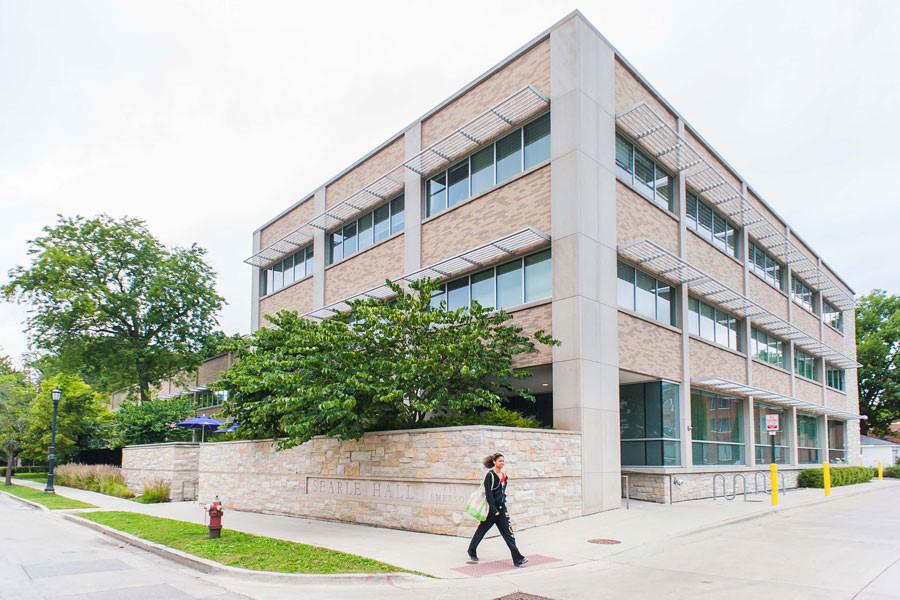ASG shares findings from report on sexual assault
The Center for Awareness, Response and Education, housed in the Northwestern University Health Service building, is the focus of an Associated Student Government report about sexual assault prevention. The report, released at Wednesday’s ASG Senate meeting, identified gaps in student knowledge and university services with regard to sexual assault awareness and prevention.
January 8, 2016
Members of Northwestern’s Associated Student Government will meet with administrators and staff in the Center for Awareness, Response and Education to discuss student perceptions of sexual assault resources on campus, including the University’s policy on alcohol in sexual assault cases and the visibility of its programs.
ASG’s findings, released in a report introduced during Wednesday’s Senate meeting, were compiled following November’s “It’s On Us” week, which focused on educating students about sexual assault awareness.
Erin Clark, assistant director of CARE, said the report findings were promising and highlighted issues the center is working to combat.
“We were excited to see some of the points that were made because they’re things that have already been on our radar,” she said. “It was, for us, very affirming.”
A primary concern raised in the report was students’ lack of knowledge about CARE and other campus sexual assault resources. Weinberg senior Erik Baker, the ASG senator for SHAPE, MARS, College Feminists and Title IX at NU, highlighted this issue at the Senate meeting.
Recently, CARE formed a student advisory board to assist the Campus Coalition on Sexual Violence, a collection of student and administrative groups who assess campus policies on sexual misconduct. While students have advised the coalition since its inception, this is the first time there will be a permanent, institutionalized body, said Carrie Wachter, CARE’s coordinator of sexual violence response services and advocacy.
Also highlighted in the ASG report was students’ misunderstanding of the University’s policy on alcohol in cases of sexual assault. During “It’s On Us” week programming, students expressed reservations about reporting sexual assault incidents involving underage drinking for fear of facing disciplinary action from the University, Baker said.
The University updated its sexual assault policy to clarify that students who report sexual misconduct will not face disciplinary action for alcohol or drug consumption surrounding the incident as long as no one else was put at risk by their behavior. The clarification came when the findings of the Campus Climate Survey on Sexual Misconduct were released in September, but because the changes were not widely publicized, many students are not aware of the change, Baker said.
CARE will address this issue, as well as campus norms surrounding alcohol and sexual activity, in a social norms campaign that will launch later this year, Wachter said.
Another concern raised in ASG’s report was that the University does not have enough sexual assault awareness and prevention programming directed at LGBT communities or people of color.
Clark said CARE has been working on a task force in cooperation with Multicultural Student Affairs to improve its outreach to minority students. The office has also been looking at queerness and relationship norms through a series of workshops called Real Talk.
“We’re working really hard to engage students in those communities,” she said.
CARE staff was “invaluable” in helping ASG members to decide what questions to ask during “It’s On Us” programming to maximize student input, Baker said.
During the Senate meeting, Baker suggested CARE allocate more funding to promoting its services year-round to alleviate student confusion around the center and its services.
CARE is funded by the University and by the second of two grants from the U.S. Department of Justice’s Office on Violence Against Women. The first grant, received in 2011, established the office, and the second funds current programming. It also allowed the office to add Paul Ang, coordinator of men’s engagement and the office’s third full-time staff member, to its team in Fall 2015.
Clark said that because much of the office’s funding comes from a federal grant, it is restricted in how it can spend that money. However, she said a significant portion is allocated to working with NU’s Student Affairs Marketing department to promote CARE’s services through social media, flyering and other outreach efforts such as programming for the upcoming Sexual Assault Awareness Month in April.
Email: [email protected]
Twitter: @maddycfox


